| |

 Draft
decision to schedule COP-6 for 13-24 November in the Hague Draft
decision to schedule COP-6 for 13-24 November in the Hague
The Subsidiary Body for Implementation has adopted a draft decision to
accept an offer from the Kingdom of the Netherlands to host COP-6 in the
Hague from 13-24 November. The year 2000 will see a particularly intense
schedule of meetings for the Parties as they prepare for the COP that
is expected to generate decisions and the political will leading to ratification
and eventual entry into force of the Kyoto Protocol. There is a growing
body of opinion in favor of timing entry into force to coincide with Rio+10.
Above right: Michael Zammit Cutajar, UNFCCC Executive Secretary; Harald
Dovland, SBSTA Chair and Jan Szyszko, COP-5 President.
The year 2000 schedule
outlined in the draft decision is as follows:
- One week of informal
meetings followed by the first sessional period from 12-16 June
- One week of informal
meetings followed by the second sessonal period from 12-16 September
- Third sessional
period i.e. COP-6, from 13-24 November.
Saudi
Arabia and G-77/China stall decision on aviation and maritime impacts
on climate
A draft decision on emissions based on fuel sold to ships and aircraft
engaged in international transport could not be adopted at a meeting of
SBSTA Monday morning after Saudi Arabia, the issue coordinator for G-77/China,
announced that he had not been able to participate in informal consultations
conducted by Switzerland's Jose Romero. The Saudi Arabian delegate said
the G-77/China had a number of concerns about the draft paper, including
the view that the draft decision included elements beyond the scope of
the subsidiary bodies.
 Interventions from New Zealand, Canada, Libya, Saudi Arabia, and SBSTA
Chair Dovland
Interventions from New Zealand, Canada, Libya, Saudi Arabia, and SBSTA
Chair Dovland
Romero confirmed
that Saudi Arabia, the delegation responsible for coordinating the issue
within the G-77/China group, had not participated in the consultations.
He said the Saudi Arabian delegation had been repeatedly invited to do
so. The SBSTA Chair, Harald Dovland of Norway, urged the Parties to complete
their work and invited the G-77/China to consider the draft decision,
consult with Romero and report back to the subsidiary body later in the
day.
SBSTA
sends a number of draft decisions to COP
At its tenth meeting, SBSTA adopted a number of draft decisions for referral
to the Conference of the Parties. Draft conclusions and decisions dealt
with the following issues:
- research and systematic
observation
- the consultative
process on transfer of technology
- transfer of technology
and coastal adaptation
- transfer of technology
and cooperation with the OECD
- methodological
issues
- the Brazil proposal
- information tools
on adaptation
- cooperation with
relevant international organizations
- methodological
issues including the estimation of carbon dioxide from forest harvesting
and wood products
The
consultations transfer of technology are to be extended through to COP-6
to allow inputs from regional workshops for the Asia and Pacific (Philippines)
and Latin America in the year 2000. The SBSTA Chair will hold meetings
with experts and Party representatives before SBSTA-12 to consider progress
in the consultation process. He will report to SBSTA-13 with recommendations
on a draft framework for meaningful and effective actions.
A draft decision
on technology transfer and coastal adaptation notes the need for the development
of endogenous capacity, technology and know how. The importance of this
issue for countries vulnerable to sea-level rise, particularly small island
states, is underlined.
Argentina
expected to announce voluntary commitment
Argentina is expected to announce details of its voluntary commitment
during the forthcoming High-Level segment, which commences Tuesday. One
hundred and seventy-three governments are now represented at the COP.
| Global
Environment Fund Chief Executive, El-Ashry, meets the Parties for
an informal exchange |
|
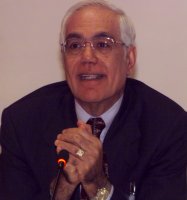 Mohamed
T. El-Ashry, Chief Executive Officer and Chairman of the Global
Environment Facility (GEF),
convened an informal exchange of views on the Facility's work in
a successful bid to respond to questions raised by Parties during
the first week of negotiations at COP-5. Parties and NGOs seized
the opportunity to quiz El-Ashry on a wide range of issues, including
the contentious question of the GEF's role in assisting with the
second round of National Communications. Mohamed
T. El-Ashry, Chief Executive Officer and Chairman of the Global
Environment Facility (GEF),
convened an informal exchange of views on the Facility's work in
a successful bid to respond to questions raised by Parties during
the first week of negotiations at COP-5. Parties and NGOs seized
the opportunity to quiz El-Ashry on a wide range of issues, including
the contentious question of the GEF's role in assisting with the
second round of National Communications.
In his responses,
Mr. El-Ashry made the following points:
- Second
national communications: In the absence of guidance from the
COP it has been difficult for the GEF to operationalize work on
second national communications. He would welcome proposals addressing
specific country needs to maintain capacity. Argentina pointed
out that preparation of communications involves a process, requiring
continuity of capacity.
- Guidance
from the UN Conventions: The GEF currently receives fragmented
guidance from the Conventions and is working to improve this situation.
- Buenos
Aires Plan of Action mandate: The GEF Council has proposed
a funding top-up to address work arising from the BAPA mandate.
- Bridging
funding: The GEF is preparing a new document on bridging funding.
On incremental costs, a London Workshop helped identify some of
the problems and possible solutions.
- Capacity
Development Initiative: El-Ashry provided an update on GEF's
Capacity Development Initiative designed to catalyze new funding.
On the general theme of capacity building, an issue that has engaged
El-Ashry for thirty years, he described an innovative transition
to programmatic funding (multi-year) and the potential for speeding
up assessments of funding applications once a framework is in
place.
- Engaging
the COP: El-Ashry described the GEF's initial approach to
the UNFCCC COP as "bashful", an approach that he hopes to overcome
through enhanced contact and dialogue, subject to the will of
the Parties. A participant noted that the GEF staff's attendance
at the contact group on non-Annex l Communications had been a
tremendous help to the Parties.
- Export
Credit and Guarantee Agencies: Responding to a question from
the Climate Action Network on the potentially important role of
Credit and Guarantee Agencies in influencing investment decisions
on climate friendly technologies, El-Ashry said the GEF had not
made direct approaches to the agencies. The World Bank described
other indirect approaches to address the role of the private sector,
including risk cover
- Transparent
budget initiative: In his final remarks, El-Ashry described
the GEF's new fee based budget system. Project fees demanded by
implementing agencies will be published on the GEF website alongside
project details. (http://www.gefweb.org/)
 A RealVideo presentation of the informal exchange is available from
this
page of the UNFCCC Video-on-demand service
A RealVideo presentation of the informal exchange is available from
this
page of the UNFCCC Video-on-demand service
|
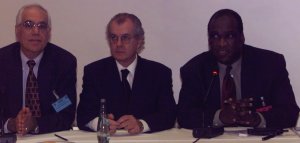
Mohamad El-Ashry, GEF CEO, Michael Zammit Cutajar, UNFCCC Executive-Secretary,
and John Ashe, SBI Chair |
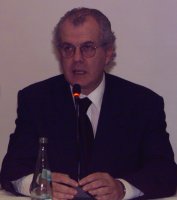
Michael Zammit Cutajar |
| SBI |
|
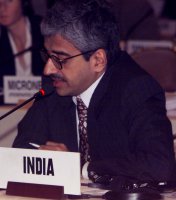
On national communications from non-Annex I countries, INDIA (represented
here by A. Gopinathan) proposed deletion of a paragraph that calls
on the CG to consider steps taken or envisaged by the Party to implement
the FCCC.
|
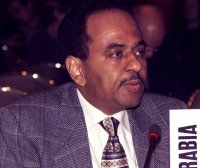
Mohammad Al Sabban, Saudi Arabia, said the proposed arrangements for
intergovernmental meetings were unrealistic and would pose problems
for developing countries |
|

Jeff
Miotke, US, supported the proposed arrangements for intergovernmental
meetings and said anything less would indicate a lack of intent
to implement the Buenos Aires Plan of Action
|
| SBSTA |
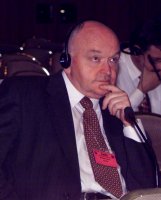
Maciej Sadowski, Poland, intervened during consideration of the draft
decision on national communications |

Patricia Iturregui, Peru, said the workshop on the development and
transfer of technology should not be contingent on resources being
available and proposed deleting text to reflect this |

Nakibae Teuatabo, Kiribati, made an intervention under the agenda
item on research and systematic observation |

Thorir Ibsen, Iceland, during consideration of the draft decision
on the impact of single projects on emissions in the committment period
|
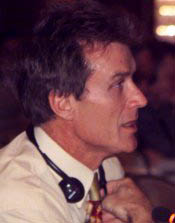
John Goodman, New Zealand |
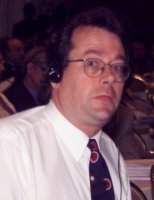
John Drexhage, Canada |
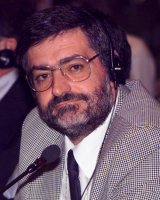
José Romero, Switzerland, chaired the informal consultations on international
transport that reconvened in the afternoon |
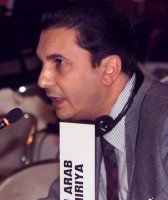
M.H. Etayari, Libya |
  To listen to IISD's RealAudio coverage of the COP-5 deliberations you
will need the free RealAudio Player. Download the free Real Audio player
by clicking on this button.
To listen to IISD's RealAudio coverage of the COP-5 deliberations you
will need the free RealAudio Player. Download the free Real Audio player
by clicking on this button.
|


















